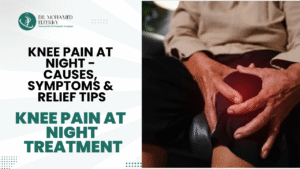Cryoablation Treatment for Chronic Pain After Knee Replacement (Cryoneurolysis)
Recovering from a total knee replacement is supposed to bring relief, but for some patients, the pain doesn’t go away. In fact, up to 20% of people continue to experience chronic knee pain after knee replacement surgery. For these individuals, everyday tasks like walking, bending, or sleeping can remain difficult long after the procedure.
This lingering pain is often due to nerve irritation or damage and may not respond well to traditional treatments like physical therapy, anti-inflammatory medications, or steroid injections. Fortunately, one minimally invasive option that’s gaining ground is cryoablation, also known as cryoneurolysis. It’s showing real promise in reducing nerve-related knee pain — especially after total knee arthroplasty (TKA).
Let’s explore what this treatment involves, how it works, and whether it might be the right solution for your knee pain.
What is Cryoneurolysis?
Cryoneurolysis is a procedure that involves freezing small peripheral nerves to stop them from sending pain signals to the brain. A specialized probe is used to target the affected nerves with cold temperatures, temporarily disrupting their ability to transmit pain. This isn’t a permanent solution, but it can provide long-lasting relief that lasts several months.
In the context of knee pain, cryoneurolysis is typically performed on the genicular nerves, which are responsible for much of the knee’s sensation. After a total knee replacement, these nerves can become hypersensitive or injured, causing persistent discomfort. By applying cold therapy directly to them, patients often report significant pain relief and improved mobility.

Why Does Chronic Pain Persist After Knee Replacement?
A total knee replacement replaces damaged cartilage and bone with artificial components, but it doesn’t always resolve every pain issue. Some of the reasons patients continue to suffer from chronic pain include:
- Nerve damage or entrapment during surgery
- Overactive pain receptors
- Postoperative scarring around nerves
- Residual inflammation
- Referred nerve pain from nearby structures
This is why some people describe ongoing burning, tingling, or stabbing pain around the kneecap or inside of the knee long after the incision has healed. These symptoms are often nerve-related and may not respond well to medications or physical therapy alone.
How Cryoneurolysis Helps
Cryoablation works by reducing the ability of specific nerves to send pain signals. The procedure is:
- Minimally invasive: It’s done using a small probe and doesn’t require cutting or stitches.
- Quick and outpatient-friendly: It usually takes less than 30 minutes.
- Targeted: It focuses only on nerves responsible for pain, preserving motor function.
- Safe and repeatable: It can be repeated every few months if needed.
For people who want to avoid taking long-term opioids or undergoing additional surgery, this treatment can be a great alternative.

Clinical Evidence Supporting Cryoablation for Knee Pain
Several studies and real-world data support the use of cryoneurolysis in chronic knee pain, especially after total knee replacement:
- A 2024 observational study found that patients with post-surgical or osteoarthritis-related knee pain experienced significant relief after genicular nerve cryoablation. Pain scores dropped by over 40% within weeks, and improvements lasted up to 6 months in many cases.
- Another randomized, controlled trial showed that patients who received cryoneurolysis before knee surgery had less postoperative pain and required fewer opioids.
- A pilot study focusing on patients with persistent pain after total knee replacement noted improvements in pain, sleep, and physical function within just 2 weeks of the procedure.
While not everyone will experience the same degree of relief, the results are encouraging — especially for those who have already tried other therapies without success.
What to Expect During and After the Procedure
Here’s how the process usually works:
- Evaluation: The doctor will identify which nerves are likely causing the pain.
- Ultrasound guidance: A probe is placed near the targeted nerves using imaging for accuracy.
- Cooling phase: The probe emits extremely cold temperatures to freeze the nerve for 60 to 90 seconds.
- Post-procedure: There may be minor swelling or bruising, but most people can resume normal activities within a day or two.
Results aren’t always immediate. Many patients begin to notice significant pain relief within one to two weeks, with full benefits felt by four to six weeks. Relief can last anywhere from 3 to 6 months or longer, depending on the individual.
Is Cryoablation Right for You?
You might be a good candidate for cryoneurolysis if you:
- Continue to have nerve-type pain months after knee replacement
- Experience burning, tingling, or stabbing pain around the knee
- Want to avoid long-term pain medication
- Are looking for a non-surgical option with minimal downtime
If the pain is clearly mechanical — related to implant loosening or infection — cryoablation may not be appropriate. But for nerve-based pain, especially when localized and persistent, it can be a powerful tool for relief.
Freeze the Pain. Keep the Motion.
Knee Cryoablation by Dr. Elfekky – Relief When Surgery Isn’t an Option
If you’re living with chronic knee pain but aren’t a candidate for surgery, knee cryoablation offers a breakthrough alternative.
This minimally invasive procedure targets and deactivates nerves responsible for knee pain using controlled cold therapy — providing long-lasting relief without the risks or recovery time of surgery.
Knee cryoablation may be the right solution for:
Patients who are too young for knee replacement
Patients medically unfit for surgery
Those with persistent pain after knee surgery
Led by Dr. Elfekky, a specialist in interventional pain management, this approach offers personalized, advanced care to help you regain mobility and quality of life.
Choose Dr. Mohamed Elfekky
Dr. Mohamed Elfekky is a highly experienced pain management specialist committed to helping patients find long-term relief through advanced, evidence-based treatments. His clinic focuses on minimally invasive therapies for chronic pain, including nerve-related conditions following orthopedic surgeries like total knee replacement.
Dr. Elfekky offers personalized assessments to determine the root cause of pain and uses techniques such as genicular nerve cryoablation to precisely target the nerves responsible. With a background in interventional pain medicine and a deep understanding of post-surgical pain syndromes, he offers a modern, patient-first approach to pain management.
Patients under his care benefit from advanced diagnostics, clear communication, and a focus on improving quality of life — not just masking pain.
About Doctors
Dr Mohamed Elfekky, Orthopedic Surgeon in Dubai, is a trusted expert in knee and joint care with over 25 years of experience in advanced, minimally invasive, and robotic-assisted surgeries. Read more
Social link
Recent Blog

Knee pain at night – Causes, symptoms & relief tips
Knee pain at night – Causes, symptoms & relief tips

The Back of My Knee Hurts When I Bend It and Straighten It: Causes & Fixes
The Back of My Knee Hurts When I Bend It

